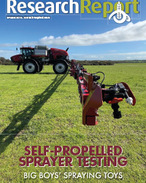This article is 5 years old. Images might not display.
FAW is an invasive moth pest which has been detected in Australia. GRDC managing director Dr Steve Jefferies said the GRDC is encouraging all grain growers - especially those throughout central and coastal Queensland - to keep an eye on their crops for signs of FAW incursions.
"Fall armyworm is a highly destructive pest - the larvae is known to feed on more than 350 plant species and they've caused significant economic losses overseas," Dr Jefferies said.
Adults are highly mobile and quite capable of travelling large distances quickly. Their migration rate is remarkably fast, estimated at almost 500 kilometres per generation.
They can also spread through people movement - it is believed that their arrival in Africa was via a passenger flight.
"GRDC has been monitoring the international spread of the incursions and anticipated the potential for an incursion of fall armyworm in Australia," Dr Jefferies said.
"GRDC has invested in research aimed at characterising fall armyworm insecticide resistance and determining the most appropriate prevention and preparedness measures.
"The main control measure available to Australian growers is application of insecticides. Experience in overseas countries is that fall armyworm has developed resistance to insecticides. So it's essential that this research is in place to rapidly inform grain growers about what chemicals are most effective to mitigate the impact of fall armyworm in Australia.
"This new fall armyworm incursion has the potential to severely damage grain crops and hit grower profitability. It's a complex issue and will need a multi-agency response. GRDC is committed to collaborating with other plant based RDCs, the Department of Agriculture, Water and Environment, the Plant Biosecurity Research Initiative (PBRI), the Queensland Government Department of Agriculture and Fisheries and Plant Health Australia (PHA) to ensure there is an effective and coordinated response to the fall armyworm incursion," he said.
The GRDC and other research organisations are working together to coordinate a cross industry response and through the Plant Biosecurity Research Initiative (PBRI) are coordinating permit submissions to the Australian Pesticides and Veterinary Medicines Association (APVMA) to streamline APVMA insecticide permit assessments and decrease turn-around timelines.
The Consultative Committee on Emergency Plant Pests (CCEPP) is Australia's key technical body for coordinating national responses to emergency plant pest (EPP) incursions, and assessing the technical feasibility for their eradication.
On 24 February the CCEPP agreed that it was not technically feasible to eradicate FAW from Australia. This was due to the pest's reproductive capacity, ability to fly long distances and wide host range, combined with the remoteness and spread of the known infestations in Australia.
"It's everyone's responsibility to watch out for this destructive pest and protect Australia's agricultural industries and environment," Dr Jefferies said.
To report a sighting call the Exotic Plant Pest Hotline 1800 084 881.
For more information on FAW, visit http://bit.ly/3aNK4d5























